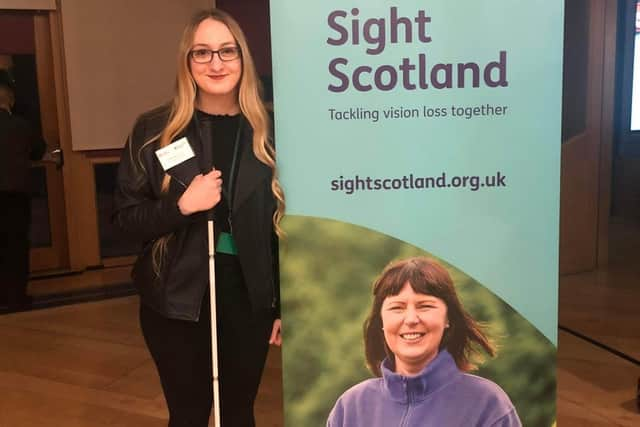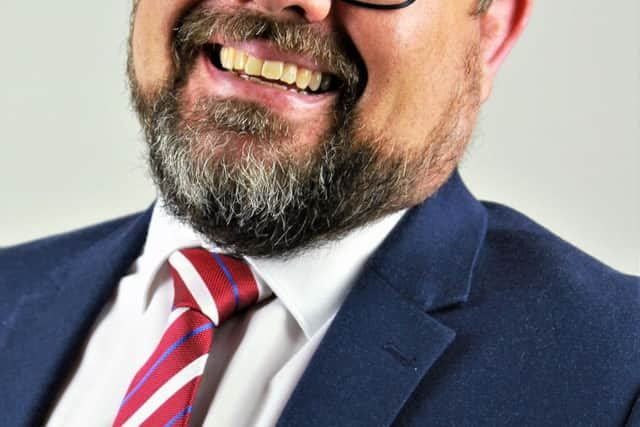Sight impaired Lasswade teenager tells her story amid calls for more specialist teachers
and live on Freeview channel 276
The latest Scottish Government pupil census figures, published in March 2022, show the total number of pupils in Scotland with a vision impairment for the 2020/21 school year was 4,930 – up from 2,593 in 2010/11.
Sight Scotland runs the Royal Blind School in Edinburgh, providing specialist education, care and learning to children and young people with vision impairment.
Advertisement
Hide AdAdvertisement
Hide AdThe charity’s outreach education services currently work in partnership with Midlothian Council, East Lothian Council and the Orkney Islands Council to provide specialist teaching and support for children and young people with vision impairment.
Samantha Gough (18) from Lasswade has been visually impaired from birth due to cerebral visual impairment (CVI) – a condition which means the eyes are healthy, however the brain’s visual pathways do not work, resulting in sight loss.
For the last year, Samantha, who is now severely sight impaired, has had a flexible placement with the Royal Blind School.
Her schooling is split between attendance at her mainstream school and the Royal Blind School, where she receives teaching and support from their specialist team, including Qualified Teachers of Children and Young People with Vision Impairment (QTVIs) and habilitation specialists.
Advertisement
Hide AdAdvertisement
Hide AdSamantha says this tailored specialist teaching and the opportunity to learn independent living skills with specialist teachers at the Royal Blind School has been “life-changing”.


She said: “As my sight has deteriorated over time, I’ve had to relearn how to live.
"I needed to do mobility training to find my way around the world again.
“At the Royal Blind School I’m learning how to use braille, which I love because I had lost the ability to read and write as my sight was taken away from me due to my condition, and reading and writing in braille has helped my reconnect with that.
Advertisement
Hide AdAdvertisement
Hide Ad"That feels amazing. I feel like I’ve found a part of myself again which I had lost when my sight deteriorated.


"I’m now working with different technologies, such as a BrailleNote Touch, to be able to type and learn how to use a computer.
“The Royal Blind School team have also been teaching me independent living skills.
"It’s things like learning cooking skills, and learning how to go to the shops and advocate for myself by saying what support I need.
Advertisement
Hide AdAdvertisement
Hide Ad"I’m also just learning how to use the bus independently, which will hopefully progress to train travel.
“The Royal Blind School teachers have also been helping me with self-advocacy.
"Now that I have this support to learn all these independent living skills, as well as specialist teaching in things like braille, I feel like I can be confident. I can be an 18-year-old.
“There are still struggles and things I’ll always need help with, but it’s about learning coping strategies and how I can do things on my own.
Advertisement
Hide AdAdvertisement
Hide Ad"It’s about building that up and being prepared for the future.
“Having this flexible placement with the Royal Blind School and their specialist teaching and support has been very beneficial.
"I’ve been here for a year, and it’s been life changing.
“I think giving pupils with vision impairment the opportunity to have this specialist support is the best thing.”
Midlothian Council’s executive director for children, young people and partnerships and chief education officer, Fiona Robertson, said Sight Scotland is currently supporting 59 visually impaired pupils in Midlothian.
Advertisement
Hide AdAdvertisement
Hide AdShe added: “Sight Scotland staff do a tremendous job working with us to make sure visually impaired children and their families get the help they need to reach their full potential.”
Craig Spalding, chief executive of Sight Scotland, spoke about the importance of more specialist teachers.
He said: “It’s vital that specialist teaching, including more QTVIs, is made available to all blind and partially sighted children and young people in Scotland.
“We are delighted to already have excellent working partnerships in Midlothian, East Lothian and Orkney, providing specialist teaching in education settings, and as flexible placements with the Royal Blind School, to blind and partially sighted pupils in those areas.
Advertisement
Hide AdAdvertisement
Hide Ad“By providing strategies, tools and understanding of vision impairment through specialist teaching, we create better opportunities for children and young people with vision impairment.
“Customised learning to enable access to the curriculum, in addition to the learning of daily living skills with specialist teachers, is essential to allow children and young people with vision impairment to thrive and reach their full potential.”
Sight Scotland, formerly known as Royal Blind, is Scotland’s largest visual impairment organisation. It has been dedicated to meeting the challenges of visual impairment for more than 225 years.
Midlothian has 59 pupils with vision impairment who currently receive specialist support locally, delivered by Sight Scotland to a number of Midlothian children and young people aged between 3-18 years of age.